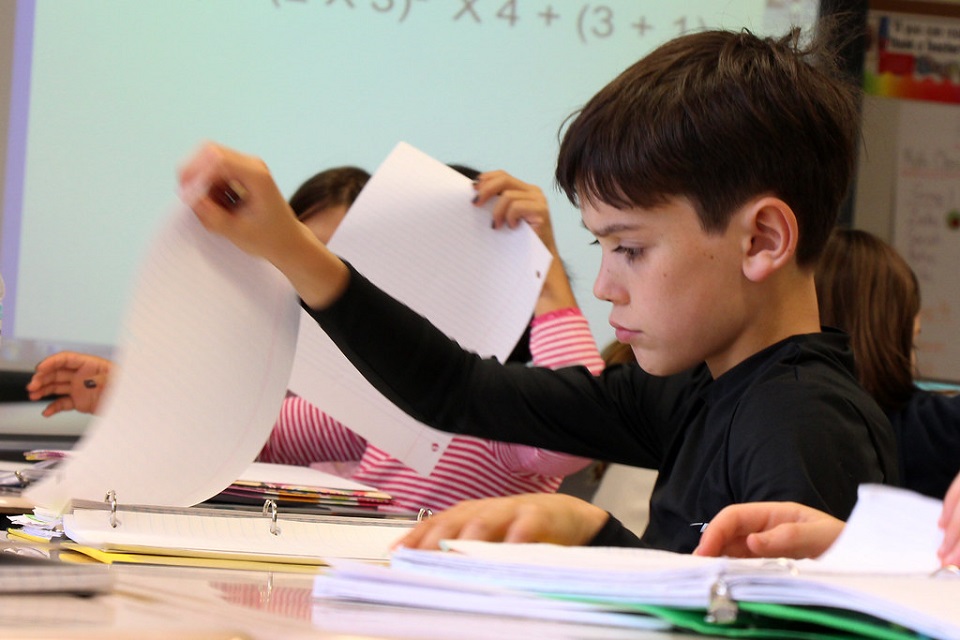AVE and BRIO to develop a national test to assess students’ mathematical literacy

● The National Mathematical Literacy Test will be available free of charge starting in the first half of 2024 for all students in Romania ● Primary school, middle school or high school students will be able to be assessed with the help of the National Mathematical Literacy Test regarding mathematical skills ● The project is financially supported by Apa Nova Bucharest as part of its efforts to support quality education for present and future generations.
AVE, together with BRIO, is working on the development of the National Mathematical Literacy Test – a tool for measuring the level of mathematical literacy of students in Romania.
Developed on the basis of financial support provided by Apa Nova Bucharest, it will be launched in the first part of 2024 and can be used for free by all teachers in the country.
“We are ahead of the announcement of the PISA 2022 results and we believe that, whatever they will be, it is necessary to understand that they show us the level at a certain moment. What is important is how we interpret and understand them, but, above all, how we act to improve them, what we do concretely next to find scalable solutions to a problem that we knew even in 2018, when 47% of Romanian students 15 year olds had difficulty solving math problems. AVE, through its mission to support schools in Romania, has in mind above all support for the development of children’s skills. The expertise integrated in the School Transformation Program will serve precisely this purpose: students to register visible progress in each of the eight key competences identified by the Council of the European Union, and mathematics is one of them. Every child in Romania needs to have at least the minimum level of mathematical literacy when they reach the age of 15, and this is the goal that brings us together”, said Silvia Toth, Director of AVE Educational Programs.
The National Mathematical Literacy Test: a standardized instrument for measuring the level of mathematical literacy in students The National Mathematical Literacy Test will be a tool that Romanian teachers will be able to access for free through the Brio.ro platform and which will measure the level of mathematical literacy of students in grades I-XII.
As a prevention method, the test will be able to identify those at risk from the perspective of mathematical literacy and monitor personalized intervention programs for students. Moreover, students who want to use it will have the possibility of self-verification according to the school year in which they are. Used by specialists in curriculum development or education policy, this tool will provide a picture of the overall level of mathematical skills nationally and will robustly and comparably measure the level of each student. Mathematical contents considered are properties of numbers and operations with numbers, measurement, geometry, data analysis, statistics and probability or algebra.
“The National Mathematical Literacy Test is the first of its kind in our country and fully complies with the scientific rigors imposed by a high-quality assessment tool. Developed on the basis of an established and internationally recognized framework, the test has been meticulously adapted to suit all age groups, from the youngest students to teenagers. Its importance lies in its ability to measure and improve Romanian children’s numeracy skills, a crucial aspect for their academic and professional development. Through this tool, we aim to provide a solid foundation for understanding numerical concepts, cultivate analytical skills and encourage the practical application of mathematical knowledge in real situations,” said Gabi Bartic, CEO of BRIO.
Teachers, direct beneficiaries of the National Mathematical Literacy Test
Although the final beneficiaries of this initiative are the students, along with the parents, the direct beneficiaries are the teachers, who will be able to use the test in the classroom to identify the level and to develop mathematical skills among students in Romania. The National Mathematical Literacy Test will be available in two forms: one short and one long, and the platform will automatically generate a report specific to the type of test taken by the student.
For the short form of the test, an ergonomic report containing only scores and graphs will be generated. For the long form of the test, two reports will be generated: an ergonomic one similar to the one previously mentioned and a detailed one in which the types of intervention that can be carried out to practice or deepen the objectives evaluated by each content subcategory will be presented.
“Education is the basic element from which our support for this project started. We believe that quality education, including as defined by the Sustainable Development Goals by the UN, is very important for our company because we are concerned with increasing the skills of our employees both from the perspective of the need to create added value for our customers and from the perspective of improving our workforce, present and future. Education contributes to reducing inequalities and achieving fair treatment at work, two major goals for us”, said Irina Munteanu, promoter of quality education from Apa Nova Bucharest.
The test will be available to any teacher starting in the first part of 2024 and is modeled after the national test used in the US to track student progress in grades 4, 8, and 12.
About AVE (Association for Values in Education)
The Association for Values in Education (AVE) is a non-profit organization, whose main objective is to bring the Romanian educational system into the top 10 in Europe by 2035. AVE wants to support the transformation of the Romanian educational system into one which promotes respect, honesty, team spirit and responsibility. You can keep up to date with AVE’s actions by following the LinkedIn, Facebook and Instagram pages.
About BRIO
BRIO® is the first and only standardized digital testing platform for Romanian students. Through the BRIO® school tests, Romanian students from grades I-XII can objectively evaluate their knowledge of the main school subjects and improve their performance in exams. Standardized tests are developed based on scientific measurement principles so that the questions, scoring, and interpretation procedures are the same for all test takers. The score of a standardized test is not subject to subjectivity, it is not dependent on the gentleness or severity of the evaluator or the lightness or difficulty of the questions. BRIO® is approved by the Ministry of Education and Research, the Testing System being a scientific product designed on the basis of the school curriculum in Romania, conceptualized by a team of teachers and international experts in testing and psychometrics.












